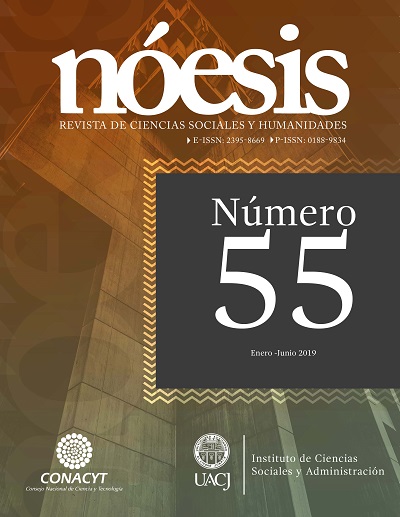Social pressure to be a mother toward academic women without children
Main Article Content
Abstract
Downloads
Article Details

This work is licensed under a Creative Commons Attribution-NonCommercial-ShareAlike 4.0 International License.
References
Acker, Sandra. 1995. Género y educación. Madrid: Narcea Ediciones.
Aguinaga, Josune. 2004. El precio de un hijo: los dilemas de la maternidad en una sociedad desigual. Barcelona: Debate.
Ávila, Yanina. 2005. Mujeres frente a los espejos de la maternidad: las que eligen no ser madres. Revista Desacatos, 17: 107-126.
Badinter, Elizabeth. 1981. ¿Existe el amor maternal? Barcelona: Paidós.
Barrón, Sandra. 2004. Ruptura de la conyugalidad e individuación materna: crisis y continuidad. En Las mujeres y los niños primero: discursos de la maternidad, coordinado por Ángeles de la Concha y Raquel Osborne, Barcelona: Icaria, 229-254.
Blackstone, Amy. 2014. Childless or childfree. Contexts, 13 (4): 68-70. https://doi.org/10.1177/1536504214558221
Bosque, Ignacio y Violeta Demonte. 2000. Gramática descriptiva de la lengua española. España: Editorial Espasa.
Casamiglia, Helena y Amparo Tusón. 2001. Las cosas del decir. Barcelona: Editorial Ariel.
Castellanos, Rosario. 1992. La abnegación: una virtud loca. Debate Feminista, 6: 287-292.
Daniluk, Judith. 1996. When biology isn’t destiny: the experience of childless women. Vancouver: University of British Columbia.
De Beauvoir, Simone. 1949. El segundo sexo. Madrid: Ediciones Cátedra.
Diccionario de la Lengua Española. http://www.rae.es/ (13 de febrero de 2016).
Díez, Carmen. 2000. Maternidad y orden social. Vivencias de cambio, en Perspectivas feministas desde la antropología social editado por Teresa del Valle Barcelona: Ariel Antropología, 155-186.
Fernández, Iriati. 2014. Feminismo y maternidad: ¿una relación incómoda? España: Emakunde/Instituto Vasco de la Mujer.
Folkman, Susan y Richard Lazarus. 1984. Stress, appraisal and coping. Nueva York: Springer.
Gillespie, Rosemarie. 2000. When no means no: disbelief, disregard and deviance as discourses of voluntary childlessness. Women’s studies international forum, 23 (2): 223-234. http://dx.doi.org/10.1016/S0277-5395(00)00076-5
Gillespie, Rosemarie. 2003. Childfree and feminine. Understanding the gender identity of voluntary childless women. Gender & Society, 17 (1): 122-136. https://doi.org/10.1177/0891243202238982
Halpern, Diane. 2007. Nurturing careers in psychology: combining work and family. Educational Psychology Review, 20: 57-64. https://doi.org/10.1007/s10648-007-9060-5
Hird, Myra y Kimberly Abshoff. 2000. Women whitout children: a contradiction in terms? Journal of Comparative Family Studies, 31 (3): 347-366.
Lagarde, Marcela. 1996. Género y feminismo. Desarrollo humano y democracia. Madrid: horas y HORAS.
Lamas, Marta. 2009. Maternidad voluntaria y aborto. Géneros. Revista de Investigación y divulgación sobre los estudios de género, 2 (6): 122-109.
Lauretis, Teresa. 1986. Feminist studies/critical studies. Indiana: University Press, Bloomington.
Lazarus, Richard. 1999. Estrés y emoción. Manejo e implicaciones en nuestra salud. Bilbao: Desclée De Brouwer.
Letherby, Gayle. 1999. Other than mother and mothers as others: the experience of motherhood and non-motherhood in relation to fertility and involuntary childlessness. Women’s Studies International Forum, 22 (3): 359-372. http://dx.doi.org/10.1016/S0277-5395(99)00028-X.
Letherby, Gayle. 2002. Childless and bereft?: stereotypes and realities in relation to “voluntary” and “involuntary” childlessness and womanhood. Sociological inquiry. 72 (1): 7-20. https://doi.org/10.1111/1475-682X.00003
Lorber, Judith. 1994. Paradoxes of gender. Nueva York: Yale University.
Macías, María, Camilo Madariaga, Marcela Valle, Javier Zambrano. 2013. Estrategias de afrontamiento individual y familiar frente a situaciones de estrés psicológico. Psicología desde el Caribe, 30 (1): 123-145.
Mamabolo, Itumeleng, Langa Malose y Kiguwa Peace. 2007. To be or not to be a mother: exploring the notion of motherhood among university students. South Africa Journal of Psychology, 39 (4): 480-488. https://doi.org/10.1177/008124630903900409
Mason, Mary Ann y Marc Goulden. 2002. Do babies matter: the effect on family formation on the life long careers of academics. Academic Search Premier, 88 (6): 21-28.
Oakley, Ann. 1974. The sociology of housework. Londres: Martin Robertson.
Palomar, Cristina. 2004. “Malas madres”: la construcción social de la maternidad. Revista Debate Feminista, 30: 12-34.
Palomar, Cristina. 2005. Maternidad, historia y Cultura. Revista de Estudios de género. La ventana, 22: 35-67.
Royo, Raquel. 2004. Maternidad, paternidad y conciliación en la CAE ¿Es el trabajo familiar un trabajo de mujeres? Bilbao: Universidad de Deusto.
Scott, Joan. 2011. Género e historia. México: Fondo de Cultura Económica.
Shaw, Rachel. 2010. Women’s experiential Journey toward voluntary and involuntary childlessness: an interpretative phenomenological analysis. Journal of community & applied social psychology, 21(2): 151-163. https://doi.org/10.1002/casp.1072
Tubert, Silvia. 1996. Introducción. En Figuras de la madre, editado por Silvia Tubert Madrid: Ediciones Cátedra, 7-37.
Williams Wendy y Ceci Stephen. 2012. When Scientists choose motherhood, American scientist, 100(2): 138-145.

